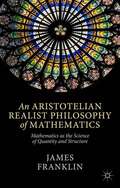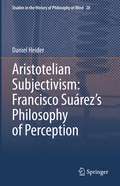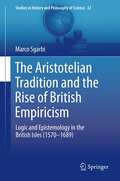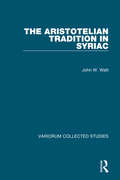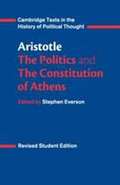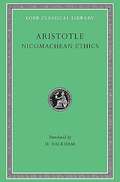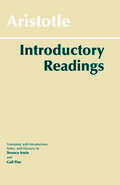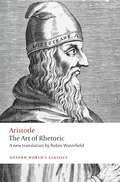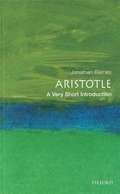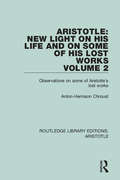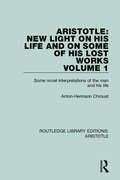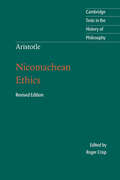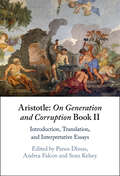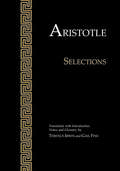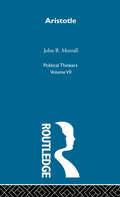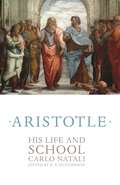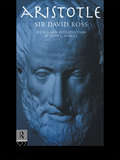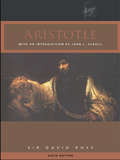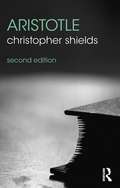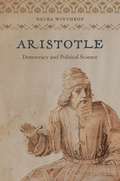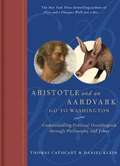- Table View
- List View
An Aristotelian Realist Philosophy of Mathematics
by James FranklinMathematics is as much a science of the real world as biology is. It is the science of the world's quantitative aspects (such as ratio) and structural or patterned aspects (such as symmetry). The book develops a complete philosophy of mathematics that contrasts with the usual Platonist and nominalist options.
Aristotelian Subjectivism: Francisco Suárez’s Philosophy of Perception (Studies in the History of Philosophy of Mind #28)
by Daniel HeiderThis monograph presents new material on Francisco Suárez’s comprehensive theory of sense perception. The core theme is perceptual intentionality in Suárez’s theory of the senses, external and internal, as presented in his Commentaria una cum quaestionibus in libros Aristotelis De anima published in 1621. The author targets the question of the multistage genesis of perceptual acts by considering the ontological “items” involved in the procession of sensory information. However, the structural issue is not left aside, and the nature of the relationship due to which our perceptions are mental representations of this or that object is also considered. The heuristic historiographical background includes not only the theories of classical authors, such as Aristotle and Aquinas, but also those of late medieval authors of the fourteenth century. These are headed by John Duns Scotus, John of Jandun, Peter Auriol and Peter John Olivi. Readers will discover the differences between Suárez’s and Aquinas’s views, as well as other sources that may have served as positive inspiration for the Jesuit’s theory. By considering the late medieval philosophy of the fourteenth century, this book helps, to a certain extent, to fill a gap in the historiography of philosophy regarding the link between late medieval and early modern scholasticism. In the first part of the book, the metaphysics of the soul and powers is considered. Chapters on the external senses follow, covering topics such as the sensible species, the causes of sensation, self-awareness, and the ordering of the external senses. A further chapter is devoted to the internal senses and the author argues that by reducing the number and functional scope of the interior senses Suárez deepens the gap between the external senses and the intellect, but he reduces it through emphasizing the unifying efficacy of the soul.This book brings a synthetic and unifying perspective to contemporary research and will particularly appeal to graduate students and researchers in theology and philosophy, especially philosophy of mind.
The Aristotelian Tradition and the Rise of British Empiricism
by Marco SgarbiOffers an extremely bold, far-reaching, and unsuspected thesis in the history of philosophy: Aristotelianism was a dominant movement of the British philosophical landscape, especially in the field of logic, and it had a long survival. British Aristotelian doctrines were strongly empiricist in nature, both in the theory of knowledge and in scientific method; this character marked and influenced further developments in British philosophy at the end of the century, and eventually gave rise to what we now call British empiricism, which is represented by philosophers such as John Locke, George Berkeley and David Hume. Beyond the apparent and explicit criticism of the old Scholastic and Aristotelian philosophy, which has been very well recognized by the scholarship in the twentieth century and which has contributed to the false notion that early modern philosophy emerged as a reaction to Aristotelianism, the present research examines the continuity, the original developments and the impact of Aristotelian doctrines and terminology in logic and epistemology as the background for the rise of empiricism.Without the Aristotelian tradition, without its doctrines, and without its conceptual elaborations, British empiricism would never have been born. The book emphasizes that philosophy is not defined only by the 'great names', but also by minor authors, who determine the intellectual milieu from which the canonical names emerge. It considers every single published work of logic between the middle of the sixteenth and the end of the seventeenth century, being acquainted with a number of surviving manuscripts and being well-informed about the best existing scholarship in the field.
The Aristotelian Tradition in Syriac (Variorum Collected Studies)
by John W. WattThis volume presents a panorama of Syriac engagement with Aristotelian philosophy primarily situated in the 6th to the 9th centuries, but also ranging to the 13th. It offers a wide range of articles, opening with surveys on the most important philosophical writers of the period before providing detailed studies of two Syriac prolegomena to Aristotle’s Categories and examining the works of Hunayn, the most famous Arabic translator of the 9th century. Watt also examines the relationships between philosophy, rhetoric and political thought in the period, and explores the connection between earlier Syriac tradition and later Arabic philosophy in the thought of the 13th century Syriac polymath Bar Hebraeus. Collected together for the first time, these articles present an engaging and thorough history of Aristotelian philosophy during this period in the Near East, in Syriac and Arabic.
Aristotelianism in the First Century Bce
by Andrea FalconThis book is a full study of the remaining evidence for Xenarchus of Seleucia, one of the earliest interpreters of Aristotle. Andrea Falcon places the evidence in its context, the revival of interest in Aristotle's philosophy that took place in the first century BCE. Xenarchus is often presented as a rebel, challenging Aristotle and the Aristotelian tradition. Falcon argues that there is more to Xenarchus and his philosophical activity than an opposition to Aristotle; he was a creative philosopher, and his views are best understood as an attempt to revise and update Aristotle's philosophy. By looking at how Xenarchus negotiated different aspects of Aristotle's philosophy, this book highlights elements of rupture as well as strands of continuity within the Aristotelian tradition.
Aristotle: The Politics and the Constitution of Athens
by AristotleThis new collection of Aristotle's political writings aims to provide the student with all the necessary materials for a full understanding of his work as a political scientist. Translated by Stephen Everson,
Aristotle: Nicomachean Ethics (Second Edition) (Loeb Classical Library #XIX)
by H. Rackham AristotleNearly all the works Aristotle (384-322 BCE) prepared for publication are lost; the priceless ones extant are lecture-materials, notes, and memoranda (some are spurious). They can be categorized as practical; logical; physical; metaphysical; on art; other; fragments.
Aristotle: Introductory Readings
by Aristotle Terence Irwin Gail FineDrawn from the translations and editorial aids of Irwin and Fine's Aristotle, Selections (Hackett Publishing Co., 1995), this anthology will be most useful to instructors who must try to do justice to Aristotle in a semester-long ancient-philosophy survey, but it will also be appropriate for a variety of introductory-level courses. Introductory Readings provides accurate, readable, and integrated translations that allow the reader to follow Aristotle's use of crucial technical terms and to grasp the details of his argument. Included are adaptations of the glossary and notes that helped make its parent volume a singularly useful aid to the study of Aristotle.
Aristotle: A Very Short Introduction
by Jonathan BarnesAristotle died in the autumn of 322 BC He was sixty-two and at the height of his powers: a scholar whose scientific explorations were as wide-ranging as his philosophical speculations were profound; a teacher who enchanted and inspired the brightest youth of Greece; a public figure who lived a turbulent life in a turbulent world. He bestrode antiquity like an intellectual colossus. No man before him had contributed so much to learning. No man after him might aspire to rival his achievements.
Aristotle: Observations on Some of Aristotle's Lost Works (Routledge Library Editions: Aristotle #2)
by Anton-Hermann ChroustOriginally published in 1973. Aristotle’s early works probably belong to the formative era of his philosophic thought and as such contribute vitally to the understanding and evaluation of the development of his philosophy. This book shows that the philosophy propagated in these lost works indicates an undeniable Platonism, and thus seems to conflict with the basic doctrines in the traditional treatises collected in the Corpus Aristotelicum. Was the author of the lost early works and the later preserved treatises one and the same person, or were some of these treatises written by members of the Early Peripatus? This, the second of two volumes, discusses in detail certain decisive aspects of Aristotle’s early works. Fascinating hypotheses and conjectures put forward here provoke discussion and further investigation in the ‘Aristotelian Problem’.
Aristotle: Some Novel Interpretations of the Man and His Life (Routledge Library Editions: Aristotle #1)
by Anton-Hermann ChroustOriginally published in 1973. The predominantly historical approach in this book heralds a belief that a better understanding of Aristotle the man, and the salient events of his life, leads to a greater insight into his work as a philosopher. This, the first of two volumes, presents interpretations of Aristotle’s life, widely interesting to any Aristotle scholars.
Aristotle: Nicomachean Ethics (Cambridge Texts In The History Of Philosophy Ser.)
by Roger CrispAristotle's Nicomachean Ethics, based on lectures that he gave in Athens in the fourth century BCE, is one of the most significant works in moral philosophy, and has profoundly influenced the whole course of subsequent philosophical endeavour. It is soundly located within a philosophical tradition, but its argument differs markedly from those of Plato and Socrates in its emphasis on the exercise - as opposed to the mere possession - of virtue as the key to human happiness, offering seminal discussions of ethical issues that are practical in their intent. Topics covered include the role of luck in human wellbeing, moral education, responsibility, courage, justice, moral weakness, friendship and pleasure. This accessible new translation by Roger Crisp follows the Greek text closely and also provides a non-Greek-reader with the flavour of the original. The volume also includes a historical and philosophical introduction and notes on further reading.
Aristotle: Nicomachean Ethics
by Roger CrispAristotle's Nicomachean Ethics, based on lectures that he gave in Athens in the fourth century BCE, is one of the most significant works in moral philosophy, and has profoundly influenced the whole course of subsequent philosophical endeavour. It is soundly located within a philosophical tradition, but its argument differs markedly from those of Plato and Socrates in its emphasis on the exercise - as opposed to the mere possession - of virtue as the key to human happiness, offering seminal discussions of ethical issues that are practical in their intent. Topics covered include the role of luck in human wellbeing, moral education, responsibility, courage, justice, moral weakness, friendship and pleasure. This accessible new translation by Roger Crisp follows the Greek text closely and also provides a non-Greek-reader with the flavour of the original. The volume also includes a historical and philosophical introduction and notes on further reading.
Aristotle: Introduction, Translation, and Interpretative Essays
by Panos Dimas Andrea Falcon Sean KelseyGeneration and Corruption II is concerned with Aristotle's theory of the elements, their reciprocal transformations and the cause of their perpetual generation and corruption. These matters are essential to Aristotle's picture of the world, making themselves felt throughout his natural science, including those portions of it that concern living things. What is more, the very inquiry Aristotle pursues in this text, with its focus on definition, generality, and causation, throws important light on his philosophy of science more generally. This volume contains eleven new essays, one for each of the chapters of this Aristotelian text, plus a general introduction and an English translation of the Greek text. It gives substantial attention to an important and neglected text, and highlights its relevance to other topics of current and enduring interest.
Aristotle
by Brad Inwood Raphael WoolfAristotle's Eudemian Ethics has been unjustly neglected in comparison with its more famous counterpart the Nicomachean Ethics. This is in large part due to the fact that until recently no complete translation of the work has been available. But the Eudemian Ethics is a masterpiece in its own right, offering valuable insights into Aristotle's ideas on virtue, happiness and the good life. This volume offers a translation by Brad Inwood and Raphael Woolf that is both fluent and exact, and an introduction in which they help the reader to gain a deeper understanding both of the Eudemian Ethics and of its relation to the Nicomachean Ethics and to Aristotle's ethical thought as a whole. The explanatory notes address Aristotle's many references to other works, people and events. The volume will be of interest to students and scholars of the history of ethics, ancient and moral philosophy, and Aristotle studies.
Aristotle: Selections
by Terence Irwin Gail Fine AristotleSelections seeks to provide an accurate and readable translation that will allow the reader to follow Aristotle's use of crucial technical terms and to grasp the details of his argument. Unlike anthologies that combine translations by many hands, this volume includes a fully integrated set of translations by a two-person team. The glossary--the most detailed in any edition--explains Aristotle's vocabulary and indicates the correspondences between Greek and English words. Brief notes supply alternative translations and elucidate difficult passages.
Aristotle: The Desire to Understand
by Jonathan LearThis is a philosophical introduction to Aristotle, and Professor Lear starts where Aristotle himself starts. The first sentence of the Metaphysics states that all human beings by their nature desire to know. But what is it for us to be animated by this desire in this world? What is it for a creature to have a nature; what is our human nature; what must the world be like to be intelligible; and what must we be like to understand it systematically? Through a consideration of these questions Professor Lear introduces us to the essence of Aristotle's philosophy and guides us through the central Aristotelian texts - selected from the Physics, Metaphysics, Ethics, Politics and from the biological and logical works. The book is written in a direct, lucid style which engages the reader with the themes in an active, participatory manner.
Aristotle
by John B. MorrallFirst published in 1977 this volume is the only account published in English in the 20th century to be exclusively devoted to an interpretation of Aristotle's political thought (as distinct from commentaries, translations and works on Aristotelean philosophy in general). It places Aristotle in his background of the Greek political experience.
Aristotle: His Life and School
by Carlo NataliThe definitive account of Aristotle's life and schoolThis definitive biography shows that Aristotle's philosophy is best understood on the basis of a firm knowledge of his life and of the school he founded. First published in Italian, and now translated, updated, and expanded for English readers, this concise chronological narrative is the most authoritative account of Aristotle's life and his Lyceum available in any language. Gathering, distilling, and analyzing all the evidence and previous scholarship, Carlo Natali, one of the world's leading Aristotle scholars, provides a masterful synthesis that is accessible to students yet filled with evidence and original interpretations that specialists will find informative and provocative.Cutting through the controversy and confusion that have surrounded Aristotle's biography, Natali tells the story of Aristotle's eventful life and sheds new light on his role in the foundation of the Lyceum. Natali offers the most detailed and persuasive argument yet for the view that the school, an important institution of higher learning and scientific research, was designed to foster a new intellectual way of life among Aristotle's followers, helping them fulfill an aristocratic ideal of the best way to use the leisure they enjoyed. Drawing a wealth of connections between Aristotle's life and thinking, Natali demonstrates how the two are mutually illuminating.For this edition, ancient texts have been freshly translated on the basis of the most recent critical editions; indexes have been added, including a comprehensive index of sources and an index to previous scholarship; and scholarship that has appeared since the book's original publication has been incorporated.
Aristotle: De Anima
by David RossSir David Ross was one of the most distinguished and influential Aristotelians of this century; his study has long been established as an authoritative survey of the life, work and philosophy of Aristotle.This clear and lucid account contains useful summaries of theories and arguments, with brief, suggestive critical comments. Aristotle's work encompassed all the branches of science and learning which were central to the intellectual life of the ancient world: logic, the philosophy of nature, biology, psychology, metaphysics, ethics, politics, rhetoric and poetics. Aristotle's borrowings from his predecessors, and his own fundamental influence on later philosophy, are also examined. Important Greek terms in Aristotle's work are explained and discussed.Aristotle is now re-issued with a new introduction by John L. Ackrill, which reviews developments in Aristotelian studies since Sir David Ross originally wrote his classic study. The bibliography has been supplemented by references to recent works. Both students of philosophy and general rea ders will find the volume an indispensable guide to Aristotle's thought.
Aristotle
by Sir David RossWritten by renowned Aristotle scholar Sir David Ross, this study has long been established as one of the foremost surveys of Aristotle's life, work and philosophy. With John L. Ackrill's introduction and updated bibliography, created for the sixth edition, the book continues to serve as a standard guide, both for the student of ancient history and the general reader.
Aristotle (The Routledge Philosophers)
by Christopher ShieldsIn this extensively revised new edition of his excellent guidebook, Christopher Shields introduces the whole of Aristotle’s philosophy, showing how his powerful conception of human nature shaped much of his thinking on the nature of the soul and the mind, ethics, politics, and the arts. Beginning with a brief biography, Shields carefully explains the fundamental elements of Aristotle’s thought: his explanatory framework, his philosophical methodology, and his four-causal explanatory scheme. Subsequently he discusses Aristotle’s metaphysics, the theory of categories, logical theory, and his conception of the human being as a composite of soul and body. The last part concentrates on Aristotle’s value theory as applied to ethics and politics, and assesses his approach to happiness, virtue, and the best life for human beings, before turning to a consideration of Aristotle's theory of rhetoric and the arts, with a special focus on his perennially controversial treatment of tragedy. This second edition includes an expanded discussion of Aristotle's method, and new sections on key issues in perception, thought, akrasia, and mimesis. It concludes with an expanded assessment of Aristotle's legacy, sketching currently emerging Neo-Aristotelian movements in metaphysics and virtue ethics.
Aristotle: Democracy and Political Science
by Delba WinthropToday, democracy is seen as the best or even the only legitimate form of government—hardly in need of defense. Delba Winthrop punctures this complacency and takes up the challenge of justifying democracy through Aristotle’s political science. In Aristotle’s time and in ours, democrats want inclusiveness; they want above all to include everyone a part of a whole. But what makes a whole? This is a question for both politics and philosophy, and Winthrop shows that Aristotle pursues the answer in the Politics. She uncovers in his political science the insights philosophy brings to politics and, especially, the insights politics brings to philosophy. Through her appreciation of this dual purpose and skilled execution of her argument, Winthrop’s discoveries are profound. Central to politics, she maintains, is the quality of assertiveness—the kind of speech that demands to be heard. Aristotle, she shows for the first time, carries assertive speech into philosophy, when human reason claims its due as a contribution to the universe. Political science gets the high role of teacher to ordinary folk in democracy and to the few who want to understand what sustains it. This posthumous publication is more than an honor to Delba Winthrop’s memory. It is a gift to partisans of democracy, advocates of justice, and students of Aristotle.
Aristotle and an Aardvark Go to Washington: Understanding Political Doublespeak Through Philosophy and Jokes
by Thomas Cathcart Daniel KleinThomas Cathcart and Daniel Klein, authors of the national bestseller Plato and a Platypus Walk into a Bar, aren't falling for any election year claptrap--and they don't want their readers to either! In Aristotle and an Aardvark Go to Washington, our two favorite philosopher-comedians return just in time to save us from the double-speak, flim-flam, and alternate reality of politics in America. Deploying jokes and cartoon as well as the occasional insight from Aristotle and his peers, Cathcart and Klein explain what politicos are up to when they state: "The absence of evidence is not the evidence of absence." (Donald Rumsfeld), "It depends on what the meaning of the word 'is' is. " (Bill Clinton), or even, "We hold these truths to be self-evident..." (Thomas Jefferson, et al). Drawing from the pronouncements of everyone from Caesar to Condoleeza Rice, Genghis Kahn to Hillary Clinton, and Adolf Hitler to Al Sharpton. Cathcart and Klein help us learn to identify tricks such as "The Texas Sharpshooter Fallacy" (non causa pro causa) and the "The Fallacy Fallacy" (argumentum and logicam). Aristotle and an Aardvark is for anyone who ever felt like the politicos and pundits were speaking Greek. At least Cathcart and Klein provide the Latin name for it (raudatio publica)!
